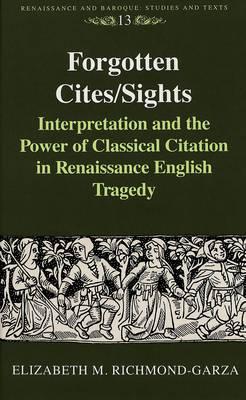Overview
This study argues for the importance of classical citations, ranging from direct quotations to invocations of theories of interpretation, for Renaissance English tragedy. After an account of tragic spectacle and the role of the imagination in the works of Aristotle and Seneca, the study presents close readings of the political, philosophical, and theatrical implications of the reappropriation of such material for several Renaissance English plays that are particularly concerned with visual epistemology, including the neo-Latin academic tragedy Perfidus Hetruscus, Thomas Kyd's The Spanish Tragedy, Christopher Marlowe's Tamburlaine the Great, Parts I and II, and William Shakespeare's Coriolanus. Informed by a theory of citations developed from Jacques Derrida, the study explores how each play, in politically volatile and topical contexts, reveals the power of visual images to coerce.
Full Product Details
Author: Elizabeth M. Richmond-Garza
Publisher: Peter Lang Publishing Inc
Imprint: Peter Lang Publishing Inc
Volume: 13
Dimensions:
Width: 16.00cm
, Height: 1.90cm
, Length: 23.00cm
Weight: 0.520kg
ISBN: 9780820422848
ISBN 10: 0820422843
Pages: 248
Publication Date: 01 April 1995
Audience:
College/higher education
,
Postgraduate, Research & Scholarly
Format: Hardback
Publisher's Status: Active
Availability: Available To Order

We have confirmation that this item is in stock with the supplier. It will be ordered in for you and dispatched immediately.
Reviews
Elizabeth Richmond-Garza's 'Forgotten Cites/Sights' is ambitious and provocative. It combines impressive learning with theoretical sophistication, measuring the power of tragic spectacle in Renaissance drama by focusing on its incorporation of an instrumental classical inheritance. (David Scott Kastan, Columbia University) 'Forgotten Cites' stands out, insofar as there is no other study that documents so thoroughly the appearance of classical citations in three case studies (Kyd, Marlowe, and Shakespeare), and uses them to test theories of the very nature of citation, quotation, allusion, and the function of these in the process of canonization of 'classical' works. As a unique study in this respect, currently of great interest in humanistic scholarship, it will be a must for every academic library. I recommend this book without hesitation. Cleverly written, engaging, fun. (Dirk Obbink, Barnard College) What is especially gratifying and rewarding about 'Forgotten Cites', is the author's blending of wide and deep learning in both the classical and Renaissance materials with contemporary theory, particularly Derrida's notions about text citation - except that unlike Derrida's epigones, this author applies her theory in a creative and fruitful fashion to different materials and thereby vindicates the theory rather than merely repeating or illustrating it. This combination of virtues should make the book of great interest to a wide audience of scholars and critics. (James V. Mirollo, Columbia University)
Author Information
The Author: Elizabeth Richmond-Garza is an assistant professor of English and Comparative Literature at the University of Texas at Austin. She received her Ph.D. in Comparative Literature from Columbia University. She has published articles on literary theory and comparative Renaissance drama. Dr. Richmond-Garza has been a Fulbright Scholar at Trinity College, Oxford and a Mellon Fellow in the Humanities while at Columbia University.



